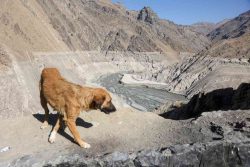
Melting snow on a ski slope is seen at a ski centre in Bjelasnica, Bosnia, on Jan. 5.
16:09 JST, March 16, 2023
BRUSSELS (Reuters) — Europe is emerging from its second-warmest winter on record, European Union scientists said March 8, as climate change continues to intensify.
The average temperature in Europe from December to February was 1.4 C above the 1991-2020 average for the Boreal winter season, according to data published by the EU’s Copernicus Climate Change Service (C3S).
That ranks as Europe’s joint-second warmest winter on record, exceeded only by the winter of 2019-2020.
Europe experienced a severe winter heatwave in late December and early January, when record-high winter temperatures hit countries from France to Hungary, forcing ski resorts to close because of lack of snow.
The European Commission said Jan. 2 that hundreds of temperature records had been broken across the continent, including the Swiss town of Altdorf reaching 19.2 C, smashing a record standing since 1864.
C3S said temperatures were particularly high in eastern Europe and the north of Nordic countries. While overall temperatures in Europe were above the norm, some regions were below-average, including parts of Russia and Greenland.
Scientists said Europe’s winters are becoming warmer as a result of rising global temperatures, due to human-caused climate change.
The unusually mild winter offered some short-term relief to governments struggling with high gas prices after Russia slashed fuel deliveries to Europe last year, with higher temperatures curbing gas demand for heating in many countries.
But the high temperatures pose risks to wildlife and agriculture. Winter temperature spikes can cause plants to start growing or coax animals out of hibernation prematurely, making them vulnerable to being killed off by later cold snaps.
Tilly Collins, deputy director of Imperial College London’s Centre for Environmental Policy, said the changing climate meant plants and animals were struggling to move to new locations to maintain their ideal temperature.
“For species with small populations or restricted ranges, this can easily tip them on a path to extinction,” Collins said.
Copernicus pointed to other climate-linked extremes, including Antarctic sea ice, which last month dropped to its lowest level for any February in the 45-year record of satellite data.
“These low sea ice conditions may have important implications for the stability of Antarctic ice shelves and ultimately for global sea level rise,” said C3S Deputy Director Samantha Burgess.
Top Articles in Science & Nature
-

Japan Institute to Use Domestic Commercial Optical Lattice Clock to Set Japan Standard Time
-

iPS Treatments Pass Key Milestone, but Broader Applications Far from Guaranteed
-

Record 700 Startups to Gather at SusHi Tech Tokyo in April; Event Will Center on Themes Like Artificial Intelligence and Robotics
-

iPS Cell Products for Parkinson’s, Heart Disease OK’d for Commercialization by Japan Health Ministry Panel
-

Japan to Ban Use of Power Banks on Airplanes
JN ACCESS RANKING
-

Japan PM Takaichi’s Cabinet Resigns en Masse
-

Japan Institute to Use Domestic Commercial Optical Lattice Clock to Set Japan Standard Time
-

Israeli Ambassador to Japan Speaks about Japan’s Role in the Reconstruction of Gaza
-

Man Infected with Measles Reportedly Dined at Restaurant in Tokyo Station
-

Videos Plagiarized, Reposted with False Subtitles Claiming ‘Ryukyu Belongs to China’; Anti-China False Information Also Posted in Japan
























